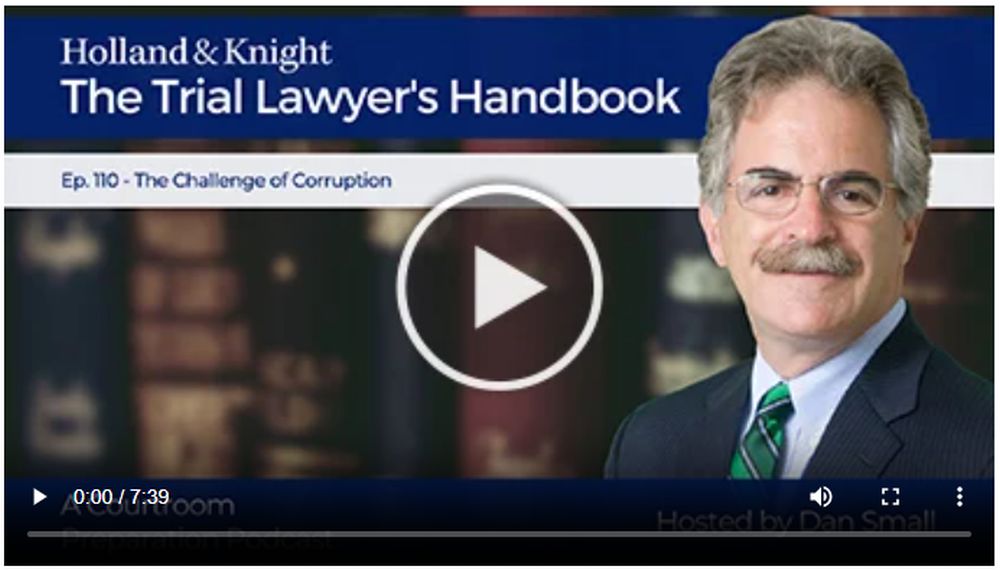- within Criminal Law topic(s)
- in United States
In this episode of "The Trial Lawyer's Handbook" podcast, litigation attorney Dan Small explores the complexity of federal corruption cases. He highlights a matter he handled as an assistant U.S. attorney in the Boston U.S. Attorney's Office Public Corruption Unit: a case in Brockton, Massachusetts, in which the IRS uncovered corrupt relationships between contractors and Frank Wallen, the city's superintendent of sewers and then-commissioner of public works. Mr. Small shares insights into how the case arose, what work his team focused on and why it was so difficult to prosecute.
Listen to more episodes of The Trial Lawyer's Handbook here.
Mr. Small is also the author of the American Bar Association (ABA) book Lessons Learned from a Life on Trial: Landmark Cases from a Veteran Litigator and What They Can Teach Trial Lawyers.
Podcast Transcript
Dan Small: Brockton is a city of about 100,000 people in southeastern Massachusetts, named after British general Isaac Brock. The city has had its high points. It's sometimes referred to as the City of Champions because it was home to boxing legends Rocky Marciano and Marvin Hagler. It had a large shoe and leather industry, and in fact, it was America's largest producer of shoes during the Civil War. But legends fade and the leather business went south and then overseas. Like other cities in the area, it has struggled with its economy, drugs, crime and other problems, including corruption.
Frank Wallen was Brockton's superintendent of sewers and then-commissioner of public works or DPW. In that position, he controlled the sewer, water and highway departments — a large amount of outside contracting, digging ditches and laying pipes, with little supervision. Not high-profile stuff, but significant money. Over time, it became known that you had to "pay to play" in Brockton. To get work from the DPW, you had pay Frank Wallen.
The IRS began investigating. As an Assistant U.S. Attorney in the Boston U.S. Attorney's Office Public Corruption Unit, I was assigned to the case. The Wallen case is a good example of why corruption cases are so challenging to prosecute.
These crimes are different because they're usually done in secret between consenting parties. Consenting, at least to the extent that, unlike a bank robbery or other crimes, one party is not a victim at gunpoint. No one involved in the crime wants to get caught, and all the parties are motivated to keep it quiet. In a bribery case, that means hiding both the bribe and the reward: the "quid" and the "quo." Uncovering them both after the fact can be very tough.
These crimes are also different because they're usually not single incidents. They often start small and then grow, fester and explode. They draw people in and then drag them deeper and deeper into the mud. A small favor becomes a larger favor, a small gift becomes a larger gift, a small payment becomes a larger payment and so on.
Such was the case with Frank Wallen. We believed that he was in a corrupt relationship with a number of contractors, but we focused on one: Charm Construction.
Charm Construction was started by John Cardelli and Domenic D'Allesandro. They were, in many respects, the classic American success story. They arrived in the United States from Italy at 17 years old with not a penny in their pocket, and the only jobs they could find was digging ditches. But they became known and respected as incredibly hard workers, got more jobs digging ditches and were finally able to scrape together enough money to buy an old pickup truck and start their own company, Charm Construction, digging water and sewer lines in the Brockton area.
Cardelli and D'Allesandro built their reputations and their company on hard work and the company grew, but they soon learned that wasn't enough. If they wanted to do serious water and sewer work in Brockton, that path went through Frank Wallen. So when Wallen started asking for small favors — a little work at his mother's house, helping his wife with a project — they agreed. Sure enough, over time, the projects for Wallen got larger and larger, and added to the projects were cash payments, cars and more. As the bribes became bigger, so did the benefits they received. Wallen even explained various ways for them to cover some of the larger payoffs: inflated invoices, dummy change orders, additions to contracts, the works. They didn't like it, but that was the way things went and they accepted it. Eventually, the payoffs became so commonplace that the IRS got wind of it and started an investigation.
This leads to the other challenge of corruption cases: developing evidence. Before the investigation started, D'Allesandro had sold his share of the company and moved his family back home to Italy, and Cardelli was sick with cancer. The IRS built a tax case against Cardelli, and when we confronted him, he readily confessed to the bribes. He was, to some extent, relieved to get it off his chest. It had clearly been weighing on him. But Cardelli's testimony by itself, even if he was well enough to testify at trial, which was highly uncertain, would not be enough. It would pit someone who had pled guilty to tax evasion, essentially pled guilty to lying, against a distinguished public servant. It would not be enough for proof beyond a reasonable doubt in a criminal trial.
Again, herein lies the essential challenge of corruption cases. Crimes done in secret, once they are no longer secret, often lack hard, uncontroverted evidence. There are no innocent bank tellers, no fingerprints, no surveillance cameras and, in this case, given the passage of time and Cardelli's poor health, no tapes. So we set out to do two things. First, the IRS went about trying to meticulously document and corroborate every favor, every project, every payment and every effort to generate cash for the payments: invoices, photos, bank records, workers and more. Every word Cardelli said, we had to try to corroborate. Second, we had to try to corroborate him with another witness, Domenic, his former partner. Tune into the next episode for Domenic's story.
The content of this article is intended to provide a general guide to the subject matter. Specialist advice should be sought about your specific circumstances.


